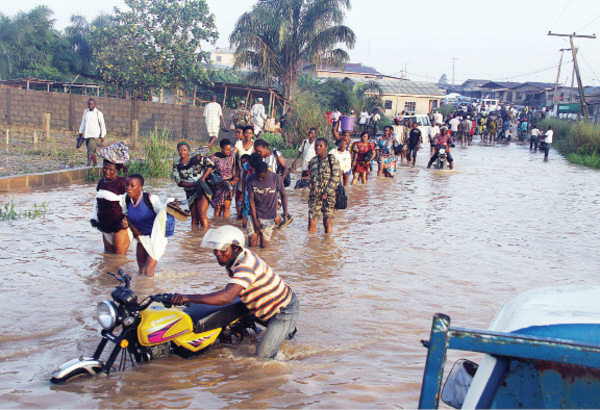Climate change has exacerbated flash floods across Nigeria
BY OLUDARA ALEGBELEYE
There has been an unhealthy, exaggerated, hypocritical emphasis on ‘climate change’ issues in Nigeria, of recent. The federal ministry of health and environmental activists have with much fanfare, campaigned for climate change causes and participated in climate change summits and events. It is a scientific fact that climate change is indeed happening, evidenced by extreme weather events, irregular rainfall patterns, loss of biodiversity and so on.
Models have suggested and experts have asserted that if humans continue to live carelessly, the situation is likely to worsen. More so, the consensus among climate scientists is that the developing world is going to bear the brunt of climate change more severely and dramatically.
However, for a country like Nigeria, climate change issues should not be a priority. For a start, let’s take a look at certain pertinent questions: what is the carbon footprint of Nigeria in comparison with countries like India, China and the United States? What is the rate of human and industrial emissions of greenhouse gases in Nigeria? What is the percentage that Nigeria contributes to the global burden of pollutants and greenhouse gases? How much of catalytic cracking, gasification/liquefaction of fossil fuels, heat and power generation by fossil fuels, coke, carbon black and asphalt production and use occur in Nigeria? Empirical evidence shows us, very low comparative with more industrialized nations of the world.
Advertisement
This is a country without any standard practice for the handling, collection and transportation of solid wastes. In recent time, we have witnessed the obscene and incorrigible manner in which refuse is strewn all over certain cities, waiting to be collected. The potential health hazards, that can arise from improper waste disposal which is a typical feature of the Nigerian system are numerous and very grave. A country with very weak health systems, poor public health response should focus more on averting imminent public health crises such as groundwater and soil contamination, water pollution, outbreak and spread of pathogenic diseases, disruption of important environmental cycles, all of which are likely complications of such irresponsible disposal of solid waste.
The government and all other relevant stakeholders who seem fascinated and concerned (unnecessarily so) by climate change should be reminded that there are more pressing needs and issues that should be tackled before focusing on the big climate change issue. Numerous health care facilities, households, entire communities, vendors do not have access to safe water. According to Water Aid Nigeria, 57 million Nigerians do not have access to safe water. A National Bureau of statistics survey showed that nearly 70 million Nigerians lacked access to safe water in 2011. Over 130 million people do not have access to adequate sanitation in Nigeria (two thirds of the population!). Over 25 000 Nigerian children die every year from diarrhoea caused by unsafe water and poor sanitation. 68% of the population has no access to a toilet. In addition to the aforementioned environmental emergencies, the country is saddled with so many challenges; poor infrastructure, uncontrolled urbanization, institutional collapse, high maternal mortality rates [25.6% by 2015, according to the WHO], to name a few.
Finally, it is important to note that impact assessments predict that global warming is not expected for the most part to create new problems; it is rather expected to exacerbate already existing challenges of malnutrition, diseases and poverty. In view of this, I dare say it is ironic and indeed irresponsible of the government and other relevant stakeholders to blow global warming issues out of proportion while neglecting the more basic and pressing environmental issues confronting the nation. Before we start to rave about reducing greenhouse emissions in Nigeria, let us combat malaria, improve sanitation, hygiene and safety of drinking water. The government through the relevant ministries has to urgently tackle the waste disposal problems facing the country. There is an urgent need to establish and promulgate laws, structures and facilities to this effect.
Advertisement
Views expressed by contributors are strictly personal and not of TheCable.






